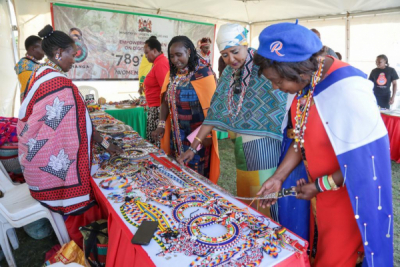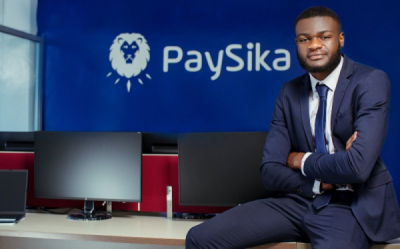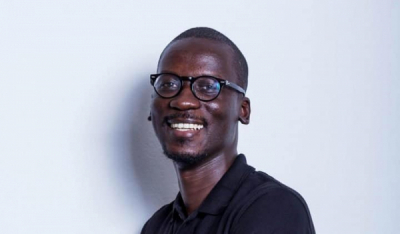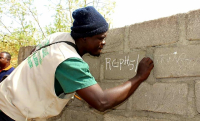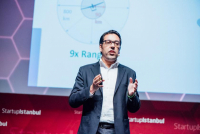The informal sector is an important segment of the African economy. Yet, actors are most of the time left to fend for themselves for various reasons. In Angola, an entrepreneur has decided to digitize the sector with a virtual marketplace.
Roque Online is a digital platform developed by Angolan eponymous startup founded in 2018 by Geraldine Geraldo. It is a virtual marketplace allowing traders to take their businesses to the next level. Its name is inspired by Roque Santeiro, a famous Angolan market active between 1991 and 2011.
“Our focus is to help anyone compete effectively in modern society. Whether you’re an informal market vendor, small business owner, or a large distributor, you can download our mobile application and start registering your inventory so we can start monetizing it on our website or through our partners’ e-commerce channels,” the startup explains on its platform.
The digital platform has a mobile app available on PlayStore and AppStore. To assess its services, users must first create an account and put up goods and services for sale. To boost the user base, the startup invites market women to offer their goods and services online. That way, it helps create additional income for the women, who were not aware of the existence of an online market where they could reach more clients.
Roque Online has become a reference marketplace to buy almost anything and get them delivered. From food products to services, customers can access anything they want from informal traders. This allows small family businesses to expand their consumer base and adapt to the changing business environment. In 2019, the startup won the first prize at Seedstars Luanda.
Adoni Conrad Quenum
Nigeria is currently working on a program to train 1 million developers in the coming 18 months, Communications Minister Isa Ali Pantami (photo) announces.
The government official made the revelation during a virtual event on the “Role of Software Testing in Nigeria’s Digital Economy.” He stressed the need to license more software developers given the increasingly major role being played by software in all aspects of human life. He also pointed at the need for a secure system to make sure the market is not ridden with vulnerable software.
“We want to see how we can license some of you to provide these services, that means if I develop software, I need to come to a certified tester to make sure I meet the standard quality assurance; all the basic bug-free, and the vulnerability assessment before I am able to sell that software,” he said.
The training program will be implemented by the National Information Technology Development Agency (NITDA) and target both professionals and inexperienced actors. During the virtual event, Isa Ali also called digital actors to support the program.
Vanessa Ngono Atangana
Entrepreneurship is the sector that creates the most jobs in Africa. However, many project initiators still fail to make their businesses more sustainable due to several factors. The Cameroonian government is trying to correct that.
Cameroon’s SME promotion agency APME presented, Monday (June 20) two digital applications to support project initiators. The first app, Notapme, is a rating system assessing SMEs’ financial strength. As for the second, MyOBus, it is an online business plan builder.
According to Jean Marie Louis Badga, director-general of the APME, the two apps will help the agency and its decentralized units in many ways. For instance, they will help “improve the bankability of the projects initiated by the SMEs supported by the agency by providing them with training materials on business plan development and by emitting an opinion on their credit risk based on a set of measurable and factual elements.”
The two apps allow project initiators to simulate in real-time business creation or development models and have remote assistance. They will also allow users (SMEs notably) to always assess their credibility, and improve the indicators usually taken into account by financial institutions during the credit awarding process.
Notapme and MyOBus were developed in the framework of the APME’s strategic positioning to reinforce its support mechanism. They also broaden the range of non-financial services offered by the public agency.
For Jean Marie Louis Badga, the two apps will let banks and investment firms have more information on loan requesters’ credibility and financial health. The apps will also help those financial institutions improve their risk management while diversifying their offers.
At the same time, Notapme and MyOBus will improve development partners' and backers’ intervention strategies by reinforcing their operational capabilities and increasing the orders they place with local SMEs, therefore increasing the latter’s capacity to go international.
"The two digital platforms are now part of our entrepreneurial ecosystem and open better opportunities for Cameroonian SMEs," said Achille Bassilekin III (photo, center), Minister of Small and Medium Enterprises, Social Economy, and Handicrafts.
Ruben Tchounyabe
Ushanga is an initiative supported by the Office of the Vice President, the Ministry of Commerce, Industry and Cooperatives, the various county governments, and the Ministry of Public Service, and Gender among others.
Ushanga is a digital platform set up by the Ushanga Initiative and supported by the Kenyan government. It aims to help women in West Pokot, Samburu, Narok, Kajiado, Marsabit, Baringo, and Turkana sell their beaded accessories online.
Speaking during the launch of the platform, the Sports, Heritage and Culture Cabinet Secretary Amina Mohamed explained that the platform would expose the women’s “beautiful work” to the world, which will then respect their “intellectual capacity.”
In Kenya, every pastoralist community has its special way to make beautiful accessories. With the platform, they can present such diverse offerings to potential customers in the local market and also to international buyers. Earrings, bracelets, chest plates, rings, and belts are some of the items that will be available on the platform.
According to Hellen Nkaissery, chairperson of the Ushanga Initiative, “as pastoralists’ women, the women who are low in the radar, now they are being lifted up through the support of our government, through the program of Ushanga Kenya Initiative, and we are being put in a platform where other parts of the country have also been supported.”
In the framework of the Ushanga Initiative, the Kenyan government has decided to invest US$4 million to impact the lives of 5,000 women. Those women will be endowed with professional skills, leading to the creation of 60 cooperatives.
Adoni Conrad Quenum
He plans to become the banker of the African unbanked population. To achieve his ambition, his idea is to combine mobile money services, which are popular on the continent, with international financial tools.
Roger Nengwe Ntafam (photo) is a Cameroonian artificial intelligence engineer and the co-founder of fintech PaySika. The startup he co-founded in February 2020, with Stezen Bisselou facilitates money transfers through a mobile app that can be loaded with mobile money. It also allows users to manage their money in real-time from Facebook Messenger, WhatsApp, and Telegram and offers requesters free virtual cards for international or online transactions.
The entrepreneur explains that he got the inspiration for this payment solution from the tribulations his father, a shop owner, used to go through for stocktaking, accounting, and petty cash management. The main thing that pushed him to create the solution was the challenge he faced while trying to pay his tuition fees during his engineering studies at Paul Sabatier University, Toulouse, France. At the time, he did not have a bank account, and paying those tuition fees was a real challenge for him.
The startup claims over 20,000 users were registered on its waitlist during the pre-launch phase. In October 2021, it raised US$300,000 from British, French, and Nigerian investors to launch activities (in the first quarter of 2022). Its current target markets are Cameroon and Gabon.
Roger's professional and entrepreneurial journey began after a brief stint in the oil industry, working as an assistant operator for Exxon Mobile.
Before starting the PaySika adventure, Roger Nengwe Ntafam sharpened his entrepreneurial skills with MyMoney, which he co-founded in 2019. The startup created a chatbot that allows users to easily manage their finances.
But even before that venture, he developed many skills, in financial technology notably, with several research centers such as the North-East Midi-Pyrénées Multidisciplinary Research Laboratory (LRPmip) and the Artificial Intelligence Center in Prague, Czech Republic.
He also participated in various entrepreneurial support and tech innovation programs such as the first cohort of French Tech Tremplin, a high-impact entrepreneurial coaching program, in 2019. In March 2022, he joined the Founder Institute's Entrepreneur in Residence program.
Melchior Koba
The tech and insurance entrepreneur has over fifteen years of professional experience in Europe and Africa. In 2018, he invested in two growth sectors: fintech and telecom namely.
Souleymane Gning (photo) is a Senegalese entrepreneur and telecom engineer. In 2018, he founded Assuraf, an insurance broker.
The aim of “Assuraf is to use online and offline communication medium to simply show Africans the inner working of the insurance sector to get them more exposed to the sector, understand its critical role and the coverage it offers,” Souleymane explains.
The insurance entrepreneur was able to successfully implement his project thanks first to his telecom engineering master’s obtained at the University of Poitiers, France, in 2003 and his over fifteen years of professional experience. He developed his professional skills in various companies, including SFR in France and Sonatel in Senegal, where he held his first management position from 2003 to 2006. He later became Cisco System’s Public Sector Manager for West and Central Africa and then Business Consultant Sicap SA (Swisscom). He also worked at Upstream, Persado, Sandvine and was a senior education advisor for EM Normandie Business School.
In 2018, the same year when he founded Assuraf, he founded eConnect, a telecom, media, and tech firm. The tech firm provides commercial tech solutions in Sub-Saharan Africa.
Melchior Koba
In the past, the processing of census data collected was strenuous and long. With digitalization, the country will improve processing time as well as the accuracy of the data collected.
Mali launched, Wednesday (June 15), its fifth population census. Dubbed RGPH5, this census will be the first to go all-digital in the country. Data will be collected and processed on tablet computers.
According to Dr. Arouna Sougané, director-general of the national institute for statistics (INSTAT), digitalization will improve the quality of the data collected and processing time. Indeed, initial results are expected for the fourth quarter of this year. He explains that the census aims to elaborate a database detailing the population size, its structure, and geographical distribution. The database will improve the efficiency of development actions as well as give an idea of the progress recorded in the implementation of development programs.
To organize the RGPH5, Mali raised XOF25 billion (US$40.2 million) thanks to support from the World Bank and other partners. It also deployed 26,327 census officials, 4,504 team supervisors, and 866 tech supports.
Per the provisions of the United Nations Statistical Commission, a population census should be carried out every ten years or so. Mali’s first population census was carried out in 1976, the second one was in 1987, and the last two were in 1998 and 2009.
Ruben Tchounyabé
Six years ago, he decided to put his IT skills and international professional experience at the service of African countries. Today, he has several clients and awards thanks to the solutions he developed to help combat environmental crimes.
Badr Idrissi (photo) is a Moroccan entrepreneur and co-founder of tech startup Atlan Space. The startup, launched in 2016, builds artificial intelligence solutions to pilot fixed-wing drones. It aims to help African countries have affordable surveillance equipment to combat environmental crimes, illegal fishing notably.
In an interview with Médias24, Idrissi explained that some countries, African notably, did not have tech solutions to effectively monitor and protect their oceans and fishery resources while "developed countries use several powerful tools, including light aircraft, satellite surveillance and other tech tools that cost millions, even tens of millions of dollars,” for the same purpose. His aim through Atlan Space is therefore to help monitor large geographical areas for the identification of anomalies or environmental threats to human health.
In 2021, Badr Idrissi successfully raised 10 million dirhams (US$1 million) to expand his startup’s intervention sector to include deforestation, desertification, and illegal mining. Last February, the startup also launched a new product.
For Atlan Space's contribution to the environment, Badr Idrissi has received several awards, including the Marine Protection Prize from the National Geographic Society and the African Entrepreneurship Award. This year, Atlan Space was one of 45 start-ups competing for the AfricaTech Awards organized during the 2022 edition of Viva Technology from June 15 to 18.
Melchior Koba
African startups are increasingly relying on venture capital funding to support their growth but, that funding mechanism is still not accessible to every one of them. So, a Nigerian startup has come up with a solution that helps the ecosystem and also gets people to invest.
GetEquity is a digital platform developed by a Nigerian fintech startup founded in 2020. The platform connects African startups with investors to help fund their growth. According to co-founder and CEO Dike Jude, the startup challenges the status quo of startup financing and venture capital by democratizing access to startup financing, “thereby expanding the pie for previously underfunded, and underserved startups.”
It also allows users, be they individuals or institutional investors to invest in the local startups they like. To fulfill its mission, the platform has a mobile app available on AppStore and Playstore. Users can create their accounts through the app or web platform by filling in personal information and loading their wallets. Once those steps are completed, they can buy shares (as low as US$10) in growing African startups or sell previously owned shares.
GetEquity claims to have attracted more than 6,000 investors on the continent.
Adoni Conrad Quenum
Four years ago, investors’ attraction to the African insurtech segment was low. In 2021, that interest rose significantly with actors keeping a watchful eye on it.
Starting from July 1, 2022, actors in the Moroccan insurance market can offer products and sign insurance contracts with buyers exclusively online. Last June 8, the Supervisory Authority of Insurance and Social Welfare (ACAPS) signed a decision outlining the regulatory requirements of the digital platforms to be set up by insurance actors to allow the online purchase of insurance contracts.
ACAPS issued the decision because the insurtech segment is steadily growing. It is getting more attractive because of its convenience, flexibility and the new offers developed. In Africa particularly, the number of start-ups investing in the segment is rising rapidly. In its report "2021 Africa Tech Venture Capital," Partech reveals that the Insurtech segment attracted US$36 million in funding in 2021. This is significant growth for a sector that was still in its infancy two years earlier.
On February 9, 2022, in Nigeria, the National Insurance Commission (NAICOM) partnered with FSD Africa to launch BimaLab, an accelerator program. BimaLab aims to drive digital innovation and ICT adoption in the insurance industry. The accelerator program will help drive digital innovation and expand the adoption of information and communication technologies in the insurance industry.
Muriel Edjo
More...
The coronavirus pandemic stalled and even reversed economic growth in several African countries. The most affected were mostly those with the lowest e-governance readiness level. That weakness must be corrected given the political, climatic, and economic risks proliferating.
Burkina Faso should develop digital services to improve its resilience to crises, the World Bank advises. In its report titled “Resilience in Uncertain Times: Promoting Digital Services,” the institution argues that investing in dematerialized services, digital technology solutions, and the internet will be beneficial to the country.
In the public sector, the development of digital services (with the implementation of e-government projects) will help preserve service continuity and ensure efficiency, in the tax segment particularly. In its latest report on its e-government development index (EGDI), the International Telecommunications Union (ITU) reveals that Burkina Faso's readiness level is still below the West African and Sub-Saharan African average.
In its 2021 national accounts, Burkina Faso's National Institute of Statistics and Demography reveals that the 6.9 percent GDP growth recorded by the country that year (after 1.9 percent in 2020) was all thanks to the public administration component (+8.3 percent), which resumed an uptrend stalled by the coronavirus pandemic.
According to the World Bank, Burkina Faso’s private sector can boost productivity and inclusion, therefore creating new growth opportunities. In the agricultural sector -which plays a key role in food security- the introduction of digital services (weather, farming practices, crops, markets, etc. services) is likely to improve farmers' performance. It can do the same in the trade and finance sectors.
To effectively make the digital sector a tool for economic and social development, the Burkinabe government must improve internet access. In January 2022, its internet penetration rate was 27.3 percent, representing just 5.95 million residents covered out of 21.80 million overall population.
Muriel Edjo
The mass retail industry is booming in Egypt since 2020. The boom is attracting new actors who either want to capitalize on the commercial opportunities or offer new financial products.
Tanmeyah Microenterprise Services, a leading microfinance institution in Egypt, recently acquired Fatura, a startup that connects suppliers with retailers. The information was disclosed on Wednesday, June 15, but the amount of the transaction was not stated.
According to Karim Awad, CEO of Tanmeyah’s parent company (EFG Hermes Holding), the deal marks a major milestone for the Egyptian microfinance institution. “This acquisition marks a major milestone for Tanmeyah, which has grown to become a key player under our Non-Bank Financial Institutions (NBFI) platform. Tanmeyah turned to this strategic acquisition to bolster its digital transformation and enrich its product and service offerings to become more holistic and support Egypt’s microfinance space. [...] We’ve always seen potential in Fatura, and we are firm believers in its ability to innovate in the B2B digital space, which is why our very own EFG EV Fintech made the decision to become one of the early investors in the company years ago,” he commented.
Fatura started operations in Egypt in 2019. In July 2020, the startup successfully raised about US$1 million in its seed round led by Disruptech with EFG Hermes and The Cairo Angels and angel investors as participating investors. In June 2021, it raised another US$3 million in a pre-series A round led by Sawari Ventures, Arzan VC, Egypt Ventures, EFG-EV, The Cairo Angels, and Khwarizmi Ventures. Within three years, it expanded its presence to 22 governorates in Egypt. It also built a network of more than 60,000 merchants.
Muriel Edjo
Côte d’Ivoire’s 2016-2020 development plan helped the country achieve 5.9% yearly growth on average. With the new plan, the country wants to do better by capitalizing on the digital sector.
Côte d’Ivoire will build a national data center and develop a 7000-kilometer of fiber-optic network by 2025, Communications Minister Amadou Coulibaly announces. The investments, which will complement others planned in the framework of the national digital development strategy, will help develop the national economy.
They were presented on Wednesday, June 15, during a meeting held in Abidjan to present the 2021-2025 National Development Plan’s financing mechanism. At the meeting, Amadou Coulibaly explained that the data center and the fiber optic projects were key priorities for his ministry because of their importance for digital transformation, which Côte d’Ivoire wants to accelerate.
The data center will allow the centralization of public services (being dematerialized) in a secure location, rendering them more efficient. The fiber optic network will enable the government to offer access to affordable high-speed internet -an essential tool for access to dematerialized services and economic opportunities- for every household.
Côte d'Ivoire approved its 2021-2025 national development strategy during the ministerial council held on December 22, 2021. It focuses on seven key points including the development of infrastructure, services, and financial services, building skills, improving the business environment and the digital economy, enhancing innovation, cybersecurity, and digital trust.
According to the World Bank, the digital economy will fetch Côte d'Ivoire more than US$5.5 billion by 2025, and more than US$20 billion by 2050, if the government and the private sector strengthen investments in the five fundamental pillars of the digital economy: infrastructure, platforms, financial services, entrepreneurship, and skills.
Muriel Edjo
He started a tech entrepreneurship venture to improve the quality of healthcare in Africa. Barely seven years later, he is one of the influential figures on the global healthTech scene.
Imodoye Abioro (photo) is a Nigerian doctor, entrepreneur, and self-taught IBM Cloud software developer. He is the founder of Healthbotics Ltd, a health tech whose stated mission is to “solve Africa’s perennial healthcare challenges.”
The young doctor and entrepreneur started Healthbiotics following the death of his best friend who bled to death in the emergency room where he was working as a Doctor-on-call. “...that loss almost broke me and so I was motivated to do something about some of these perennial problems facing our hospitals and care delivery system,” he told Pan-African Visions in an interview in 2021.
To fulfill its mission, with Abioro at the helm, Healthbiotics developed two flagship products notably Mediverse and Lend an Arm. The first is a digital AI-powered health record backed by blockchain technology. It allows doctors and nurses to record patients’ health information “with just their voice, eliminating the endless need for writing and typing.” The second product was created in 2017 to connect blood donors and hospitals with blood banks. With that mobile and web AI-powered solution, blood donors and recipients can chat, organize, or join a blood donation campaign. They can also find the nearest blood bank.
The two products earned Abioro several awards in 2020, including the AI for development Challenge, the Young Innovator Award at the World Summit Awards, and the African App Launchpad Cup. In 2021, he was one of the winners of the African Young Innovator Award for Health.
Apart from Healthbiotics, he also co-founded Bimi Online for Africa (in 2018), a health information aggregation platform that he served until December 2019 as the Chief Technology Officer. He was also, from 2019 to 2020, the Chief Technology Officer of Future Food Project, a startup committed to “ending malnutrition in Africa.”
Melchior Koba





